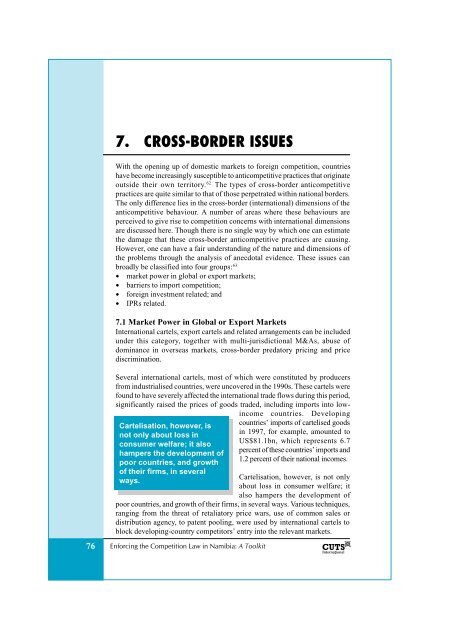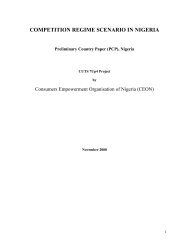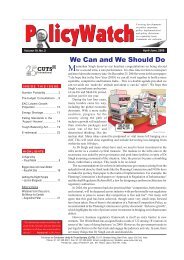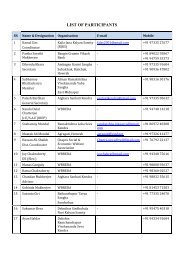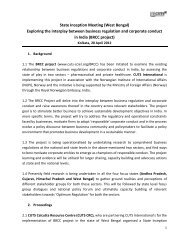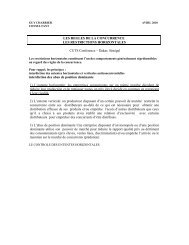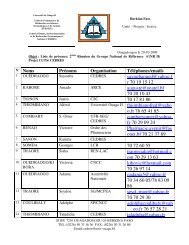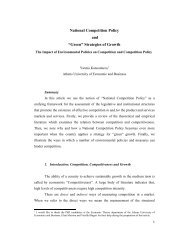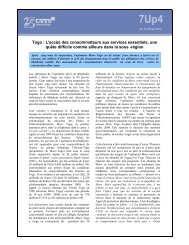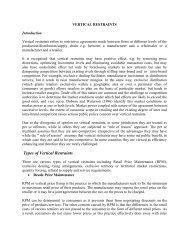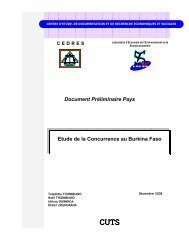Enforcing the Competition Law in Namibia A Toolkit - cuts ccier
Enforcing the Competition Law in Namibia A Toolkit - cuts ccier
Enforcing the Competition Law in Namibia A Toolkit - cuts ccier
You also want an ePaper? Increase the reach of your titles
YUMPU automatically turns print PDFs into web optimized ePapers that Google loves.
7. CROSS-BORDER ISSUESWith <strong>the</strong> open<strong>in</strong>g up of domestic markets to foreign competition, countrieshave become <strong>in</strong>creas<strong>in</strong>gly susceptible to anticompetitive practices that orig<strong>in</strong>ateoutside <strong>the</strong>ir own territory. 62 The types of cross-border anticompetitivepractices are quite similar to that of those perpetrated with<strong>in</strong> national borders.The only difference lies <strong>in</strong> <strong>the</strong> cross-border (<strong>in</strong>ternational) dimensions of <strong>the</strong>anticompetitive behaviour. A number of areas where <strong>the</strong>se behaviours areperceived to give rise to competition concerns with <strong>in</strong>ternational dimensionsare discussed here. Though <strong>the</strong>re is no s<strong>in</strong>gle way by which one can estimate<strong>the</strong> damage that <strong>the</strong>se cross-border anticompetitive practices are caus<strong>in</strong>g.However, one can have a fair understand<strong>in</strong>g of <strong>the</strong> nature and dimensions of<strong>the</strong> problems through <strong>the</strong> analysis of anecdotal evidence. These issues canbroadly be classified <strong>in</strong>to four groups: 63• market power <strong>in</strong> global or export markets;• barriers to import competition;• foreign <strong>in</strong>vestment related; and• IPRs related.7.1 Market Power <strong>in</strong> Global or Export MarketsInternational cartels, export cartels and related arrangements can be <strong>in</strong>cludedunder this category, toge<strong>the</strong>r with multi-jurisdictional M&As, abuse ofdom<strong>in</strong>ance <strong>in</strong> overseas markets, cross-border predatory pric<strong>in</strong>g and pricediscrim<strong>in</strong>ation.Several <strong>in</strong>ternational cartels, most of which were constituted by producersfrom <strong>in</strong>dustrialised countries, were uncovered <strong>in</strong> <strong>the</strong> 1990s. These cartels werefound to have severely affected <strong>the</strong> <strong>in</strong>ternational trade flows dur<strong>in</strong>g this period,significantly raised <strong>the</strong> prices of goods traded, <strong>in</strong>clud<strong>in</strong>g imports <strong>in</strong>to low<strong>in</strong>comecountries. Develop<strong>in</strong>gCartelisation, however, isnot only about loss <strong>in</strong>consumer welfare; it alsohampers <strong>the</strong> development ofpoor countries, and growthof <strong>the</strong>ir firms, <strong>in</strong> severalways.76 <strong>Enforc<strong>in</strong>g</strong> <strong>the</strong> <strong>Competition</strong> <strong>Law</strong> <strong>in</strong> <strong>Namibia</strong>: A <strong>Toolkit</strong>countries’ imports of cartelised goods<strong>in</strong> 1997, for example, amounted toUS$81.1bn, which represents 6.7percent of <strong>the</strong>se countries’ imports and1.2 percent of <strong>the</strong>ir national <strong>in</strong>comes.Cartelisation, however, is not onlyabout loss <strong>in</strong> consumer welfare; italso hampers <strong>the</strong> development ofpoor countries, and growth of <strong>the</strong>ir firms, <strong>in</strong> several ways. Various techniques,rang<strong>in</strong>g from <strong>the</strong> threat of retaliatory price wars, use of common sales ordistribution agency, to patent pool<strong>in</strong>g, were used by <strong>in</strong>ternational cartels toblock develop<strong>in</strong>g-country competitors’ entry <strong>in</strong>to <strong>the</strong> relevant markets.


